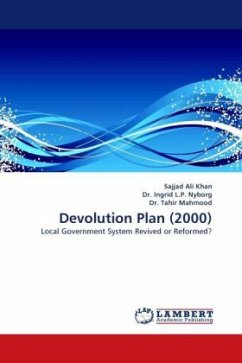On August 14th 2000, the military regime in Pakistan, unveiled a Local Government Plan intended towards strengthening the democratic institutions and towards empowering the people at the grassroots. It was argued that the Plan would increase access of marginalized groups in society to politics, increase participation of ordinary citizens both in politics as well as the delivery of services, enhance accountability of the government functionaries as well as elected members and improve the delivery of social services. The Devolution Plan (2000) paved the way for the reestablishment of local governments at the district and sub-district levels. According to the Plan, political, administrative and fiscal powers were devolved to the local governments at the union, tehsil and district levels. The fact that local governments in Pakistan in the past have mainly been used by regimes to legitimize control over the state and to achieve future survival makes this ambitious attempt controversial. Especially, its contextual resemblance with the previous two attempts at local government reforms, further strengthen the notion of regime legitimization and survival.
Bitte wählen Sie Ihr Anliegen aus.
Rechnungen
Retourenschein anfordern
Bestellstatus
Storno








